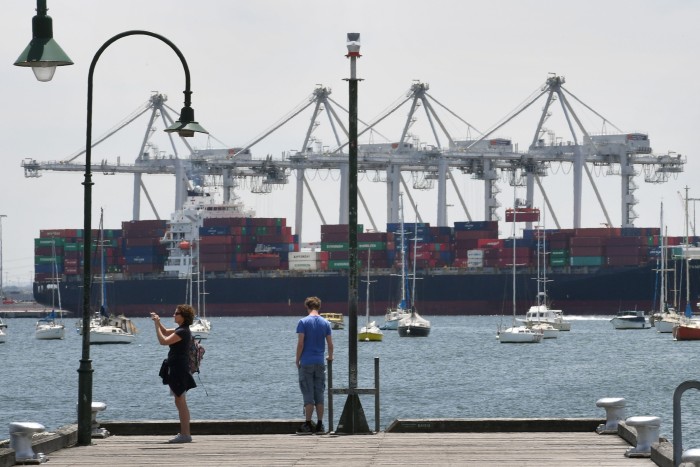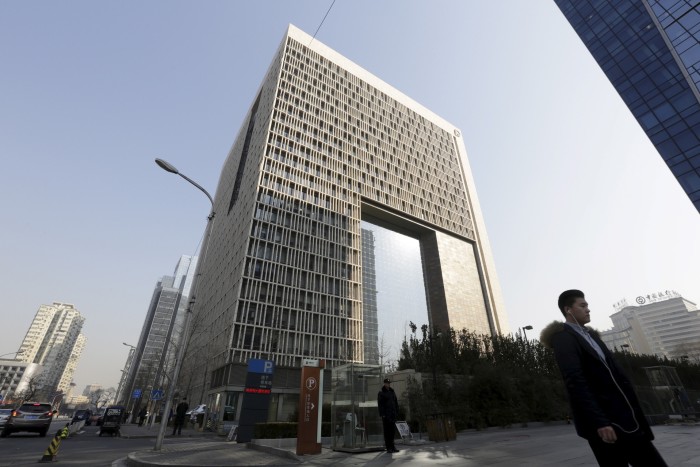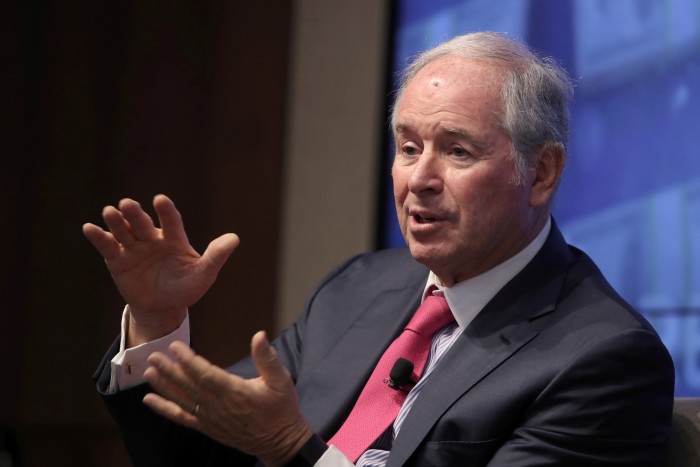
An IVC Evidensia veterinary practice in Sweden may not appear to have much in common with a Vena Energy solar project in Taiwan, or GardaWorld security personnel at a Canadian ice-hockey game.
But some of the capital that helps sustain all three companies comes from the same place: the People’s Republic of China.
Private equity firms EQT, Global Infrastructure Partners and BC Partners — the immediate owners, respectively, of the three businesses — are just three among dozens of western buyout groups that Chinese state-backed investors such as the State Administration of Foreign Assets and China Investment Corporation have poured money into, according to people familiar with their affairs and an analysis of regulatory filings.
These relationships, often established via offshore vehicles, have enabled Chinese state funds to deploy hundreds of billions of dollars into western economies, taking indirect stakes in companies across sectors such as healthcare, technology and industrial even as regulators and politicians move to reduce the west’s economic dependency on China.
CIC and Safe are among the world’s largest investors in so-called alternatives — an umbrella term that describes a category of illiquid investments dominated by private equity.
The two have about a quarter of their respective $1.35tn and $1tn in assets invested in alternatives, according to data provider and consultancy firm Global SWF. Additionally, the Hong Kong Monetary Authority, the territory’s de facto central bank, has about $62bn invested in private equity and real estate. It also owns a stake in CVC Capital Partners, one of Europe’s biggest buyout firms, and has invested in its funds, according to two people with knowledge of the matter.
These indirect investments in private equity funds have been increasing as a result of western governments and regulators taking steps to stop the same Chinese state funds from investing directly in companies and infrastructure.

They have also been helped by the growth of the private equity industry, which over the past three decades has grown from a niche corner of the financial services sector to a near $13tn asset class. Its rapid growth has turned it into an important conduit for global capital flows, with firms such as Blackstone, KKR and Carlyle Group managing and investing money on behalf of sovereign wealth funds, endowments, super-rich individuals and state pension plans, among others.
Private equity executives insist there is no risk to national security in having money from Chinese state entities in their funds because the way they are structured typically does not give such investors board seats or voting rights. Indeed, some see it as a risk-free way to attract Chinese capital without giving up any actual corporate influence.
However, the close relationship between private equity and the Chinese state has become increasingly at odds with the shifting political mood in western capitals, where governments have become much more vigilant about the potential for Chinese influence over strategic industries.
In the case of private equity, this is aggravated by a wider lack of transparency. “It’s essentially a black box, in terms of the origins of the money,” says Lily McElwee, a China expert at the Center for Strategic and International Studies in Washington. “It’s not something the US and others have been able to address, mainly because it’s so opaque.”

The investments by Chinese state-based funds are starting to attract political scrutiny because they have created ties between Beijing and western economies that could be nearly impossible to unpick.
“It is deeply concerning that Chinese state investors effectively own such large swaths of our economy and infrastructure, through their investments in private equity funds and other investment vehicles,” says Alicia Kearns, a Conservative MP who chairs the influential foreign affairs select committee in the UK. “The private nature of these funds means it is impossible to know the true extent of this phenomenon.”
But Peter Lu, global head of law firm McDermott Will & Emery’s China practice, who has represented Chinese state-owned funds on their foreign deals, says regulators are increasingly starting to pay attention to the money behind private equity funds.
“Increasingly for big deals, PE funds have to tell US and UK regulators who is behind them through national security filings,” he says. “You’ve got investors not just from China but also from Saudi, Qatar, all of the world, in these deals. It’s very hard for a big sovereign wealth fund to hide. I advise my clients: be very transparent from the start.”
CIC declined to comment. Safe acknowledged a request for comment but did not respond.
‘A paradigm shift’
The relationship began in earnest just before the financial crisis.
On May 20 2007, the Chinese government announced what was then its most eye-catching overseas deal: the acquisition of a $3bn stake in US private equity giant Blackstone.
At the time, Blackstone’s billionaire founder Stephen Schwarzman hailed the deal as a “paradigm shift in global capital flows” and created ties between CIC and the Wall Street firm that persist today, even though CIC has since sold its stake.
Less than six months later the Chinese government formalised its ambitions to invest overseas when it set up CIC, seeded with $200bn.
The fallout from the global financial crisis helped the Chinese sovereign wealth funds build closer ties with private equity firms, many of which were struggling to raise money from more traditional sources of capital.
The Chinese funds were not alone. The global financial crisis catalysed sovereign wealth interest in private capital as they repositioned their portfolios away from low-return government bonds into higher risk, higher yielding alternative assets like private equity and infrastructure.
Investment firms and consultants clamoured to help build closer relationships between private equity barons and cash-rich sovereign wealth funds, often based in Asia or the Middle East.
Hamilton Lane, an influential US adviser to investors like public pension plans and sovereign wealth funds, won lucrative mandates to help build out at least one Chinese sovereign fund’s private equity portfolio, while US fund picker GCM Grosvenor set up a secondment programme with CIC, according to a person familiar with the matter. Both companies declined to comment.
“Every single fund of funds and gatekeeper has worked for CIC at one point,” says one industry executive.
These relationships helped the Chinese state funds to quickly expand their operations. According to people familiar with the matters, and an analysis of regulatory filings, the list of firms that have received investments is a who’s who of the buyout industry: Carlyle Group, Permira, BC Partners, EQT, Brookfield, Nordic Capital, CVC Capital Partners, Blackstone, Ardian, Hg Capital, Bridgepoint, Eurazeo, Triton and Global Infrastructure Partners (GIP) are among them.
China’s sovereign wealth funds, specifically CIC, have also invested directly into companies alongside private-equity managers in infrastructure assets. In one, Singaporean renewable energy provider Equis Energy, it took a direct stake alongside GIP, in which it is also an investor.
Macquarie and Blackstone have also co-invested with CIC in this way, according to one former CIC employee.
During the 2010s, western governments, particularly in the UK, welcomed Chinese investment with open arms. China’s sovereign wealth funds bought stakes directly in UK trophy assets such as Heathrow airport, as well as utility Thames Water and a unit of the National Grid. In 2015, the prime minister at the time David Cameron called for the UK to become “the partner of choice” for China in the west in a speech marking the visit of the Chinese president Xi Jinping. Cameron even tried to set up his own private equity firm with CIC’s backing, though the initiative was later abandoned.
In the US, Chinese net direct investment hit a record of nearly $50bn in 2016, data from think-tank Rhodium Group shows.
Political backlash
Donald Trump’s election as US president in 2016 started to bring China’s outbound direct investment ambitions to a halt. New legislation was passed in 2018 to expand the powers of the Committee on Foreign Investment in the United States, a government agency that monitors and sometimes blocks direct investment with national security implications.
The heightened scrutiny led to a slowdown in Chinese investment in the US, with the total value of deals struck falling to under $10bn in 2019 and 2020, the Rhodium data shows.
“We’ve not seen many [direct] investments from Chinese sovereigns in the past few years,” says Diego Lopez, managing director at sovereign wealth fund specialist Global SWF. “They have had problems with Cfius and deploying direct capital into the US is not easy.”

However, the clampdown on direct investment did not prevent China’s state-backed funds deploying significant amounts of cash into western economies indirectly, through private funds. This helped wealth funds fly under the radar of regulators and politicians, people familiar with the matter said.
“We stepped up our investments in private markets . . . continued to expand our network of high-quality managers, and deepened our co-operation with external investment partners,” CIC’s chair and chief executive Peng Chun wrote in the corporation’s annual report last year. This took CIC’s private market commitments to a record high, Chun said, comprising nearly 50 per cent of their overseas investment portfolio.
CIC has also struck a series of partnerships with managers that gave it a foothold in an array of smaller and midsized companies across Europe and North America, which it helps expand into China. This involved setting up separate funds with investment firms Triton, Charterhouse, Eurazeo, Goldman Sachs and Investindustrial, among others.
These funds in turn invested in assets ranging from California-based industrial company Boyd Corp, Dutch medical business Dutch Ophthalmic Research Center and the UK’s Phastar, a data science company focused on clinical trials, according to people familiar with the matter and media reports.
Some of the sovereign wealth funds invested under monikers other than their own. For instance, Safe invested in some European buyout firms through an affiliate called Rhombus Kaiser, according to one person. Regulatory filings show an entity called Rhombus Kaiser Ltd invested in European funds, including one managed by Bridgepoint.
Russia prompts rethink
One reason the Chinese investments in private equity have attracted so little attention is that the potential risks are much less clear-cut than with direct acquisitions.
According to executives in the industry, the private equity funds that China and other states have invested in are usually structured in such a way that the investors, known as limited partners, do not exercise day-to-day control over the companies that their money is used to acquire.
“It’s all passive investment and it’s a good way to get foreign capital in,” says one industry lobbyist.
But even though private equity executives insist there is no problem with taking money from Chinese state funds, they privately acknowledge that the political climate has changed. In addition to the rising tension between Washington and Beijing, they increasingly wonder whether the US will start to view investments from HKMA as essentially Chinese capital, given the way in which China has asserted its authority in the former British colony.
One sign of the sensitivity over the subject is that industry executives are generally unwilling to speak publicly about the investments they have received from China.
Russia’s invasion of Ukraine last year also prompted a reassessment of the industry’s relationship with China. “It definitely was a wake-up call,” says HK Park, managing director of Crumpton Global and a former Pentagon official. “Many corporations and investors were surprised by how quickly sanctions [against Russia and Russian oligarchs] snapped into place and are now seeking geopolitical expertise for the next crises.”
As buyout groups and their managers scrambled to assess their exposure to Russia in the early days of the war, including how much of the money in their funds came from the country, several executives said privately that the exercise would be far more difficult if, for instance, similar sanctions were imposed in the event of China moving against Taiwan.
“The percentage of Chinese money in our funds is something we have to be very aware of,” says one senior executive at a private equity firm that backs technology companies. “It’s important to diversify as you will be managing the money for a decade or so and the geopolitical situation can change a lot in that time.”
The lack of transparency about investments from sovereign wealth funds, which are generally responsible for their own disclosures, adds to the difficulties.
“The level of disclosure among SWFs is self-administered so we see quite some disparity between funds,” says Imogen Liu, an assistant professor of International Political Economy at Vrije Universiteit Amsterdam. “Private equity funds are black boxed. We don’t really know how they manage client money and this has geopolitical implications.”
McElwee, who has done extensive research on Chinese tech investments in the US, says the large sums being channelled through private equity funds could make it much harder for the US government to consider using sanctions as a policy tool against Beijing in the event of heightened tensions between the two countries.
“The more China is integrated financially and economically, this will act as a deterrent to introducing sanctions or mean it’s very difficult to implement them,” she says.

While firms are viewing Chinese state money with growing caution, it has not yet prevented them accepting the cash. Last year, Chinese sovereign funds made commitments to firms including software investor Hg, Nordic Capital and Cinven, say people familiar with the matter. Regulatory filings corroborate the claims.
Leading figures in the industry, including Blackstone’s Schwarzman, and senior executives from France’s Eurazeo, Italy’s Investindustrial and the UK’s Charterhouse, have also been spending time in China and meeting with leading figures at its sovereign funds including CIC.
More European governments are now following the US in tightening their oversight of Chinese direct investments, in some cases creating powers to reassess regulatory approval for past deals. Rishi Sunak, the British prime minister, last year described China as a “systemic challenge” and said he would seek to reduce Britain’s economic dependency on China.
But regulatory scrutiny has not yet extended to private funds.
“The government has the power to legislate similar restrictions upon the ultimate ownership of UK assets by foreign powers and hostile states,” Kearns says.
“And [it] should look very closely at how best to ensure transparency in the private fund space more broadly, and ensure the protection of our critical national infrastructure in particular.”